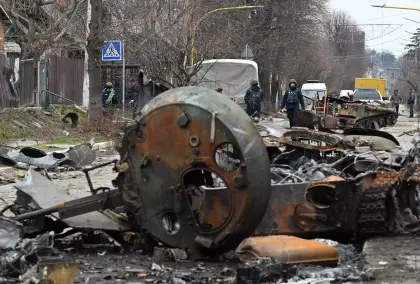Committing war crimes have become an integral part of how Moscow wages war. Russia has for decades used war as a method to achieve its geopolitical interests and war crimes as a way to win these wars, says the head of the organization that jointly received the Nobel Peace Prize this year.
Speaking in an expansive interview with RFE/RL’s Ukrainian Service, Oleksandra Matviychuk, who heads the Center for Civil Liberties, said “They learned that they can do whatever they want because they weren’t punished for war crimes in Chechnya, Moldova, Georgia, Mali, or Syria.”
JOIN US ON TELEGRAM
Follow our coverage of the war on the @Kyivpost_official.
Matviychuk says that the fact remains absolutely obvious that all the crimes perpetrated by the Russian military are systemic in nature. They are not committed by any one specific unit of the armed forces of the Russian Federation. War crimes are part of Russia’s culture of warfare.
As a lawyer, Oleksandra wants to use the high authority of the organization to bring the perpetrators of alleged war crimes to justice.
The example of the Nuremberg Trials is often cited as a template in such cases.
However, Nazi war criminals were brought to justice only after the defeat of Germany in World War II. Similar efforts to hold Russia accountable can begin immediately, Matviychuk believes.
“We don’t have to wait for Russia to lose. Why do we make people’s demands for justice dependent on this?” Matviychuk asks. “We must now create an international tribunal and begin all the necessary procedures to bring Russian war criminals to justice.”

Zelensky Meets CIA Director William Burns in Ukraine
With the beginning of Russia’s full-scale invasion of Ukraine, the Center for Civil Liberties resumed its work. Its main activity has now become the documentation of war crimes committed in Ukraine during the war.
The organization collects information not from open sources, as many well-known respected organizations do, but “from the ground”. After all, time passes – traces of destruction disappear, ruins are restored, human memory is erased. Therefore, it is very important to restore every war crime.
By October 2022, the Center for Civil Liberties had, together with its partners, documented around 21,000 cases that, according to human rights activists, are war crimes. Information about them is entered into a single electronic database and can subsequently be used in courts – national and international, in those that exist and those that are yet to be created.
You can also highlight the text and press Ctrl + Enter






